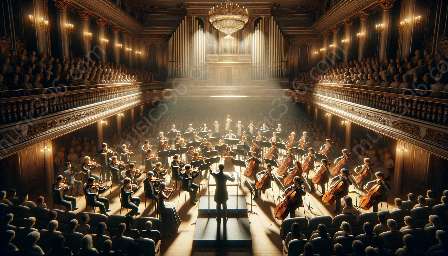Classical music criticism plays a crucial role in shaping the public's perception of classical compositions and their composers. Critics hold ethical responsibilities in representing the intentions of composers, as their representations can significantly impact how the works are understood and appreciated. This topic cluster explores the ethical considerations, challenges, and implications surrounding classical music criticism and the portrayal of composers' intentions.
Understanding Composers' Intentions
Before delving into the ethical responsibilities of critics, it is important to understand the concept of composers' intentions in classical music. Composers often embed their thoughts, emotions, and artistic expressions within their compositions. These intentions may reflect historical, cultural, or personal contexts that influenced the creation of the musical piece.
Some composers leave behind explicit instructions in their scores, providing valuable insights into their intentions regarding tempo, dynamics, articulation, and emotional nuances. However, in many cases, composers may have passed away, leaving the interpretation of their intentions open to debate and speculation.
The Influence of Critics
Classical music critics serve as mediators between composers and audiences. Through their reviews and analyses, they shape public perception and understanding of classical compositions. Their interpretations and evaluations can significantly influence how composers' intentions are conveyed and received by the listeners.
Critics' writings often serve as educational tools, offering historical context, technical analysis, and critical perspectives on classical works. However, the impact of their interpretations extends beyond mere analysis, as they directly influence the way audiences engage with and appreciate the music.
Ethical Responsibilities of Critics
When evaluating the ethical responsibilities of critics in representing composers' intentions, several key considerations come to light. Firstly, critics should strive to accurately comprehend and convey the original intentions of composers. This requires extensive research, historical understanding, and empathy towards the context in which the compositions were created.
Furthermore, critics must exercise caution to avoid imposing their personal biases or interpretations onto the works they critique. While subjective perspectives are inherent in criticism, it is crucial for critics to distinguish between their own interpretations and the composers' intentions, thereby presenting a balanced and respectful portrayal.
Transparency and honesty are paramount in classical music criticism. Critics must disclose the sources of their information and provide a clear justification for their interpretations. By acknowledging the limitations of their understanding and the potential for varied perspectives, critics can foster a more nuanced and open dialogue about composers' intentions.
Challenges and Controversies
The representation of composers' intentions through criticism is not without its challenges and controversies. Disagreements among critics, scholars, and performers regarding the interpretation of historical documents or ambiguous notations in scores can lead to conflicting portrayals of composers' intentions.
Additionally, the evolution of musical styles and performance practices over time adds complexity to the ethical responsibilities of critics. As contemporary interpretations diverge from historical conventions, critics must navigate the balance between respecting tradition and embracing innovation while being cognizant of composers' original intentions.
Impact on Composer Legacies
Classical music critics bear the responsibility of preserving and honoring composers' legacies. The representations of composers' intentions in critiques and historical accounts contribute to the perpetuation of their artistic achievements and historical significance. By accurately conveying composers' intentions, critics can aid in the preservation of their artistic integrity and ensure that their contributions to classical music are understood within the appropriate contexts.
However, inaccurate or misguided interpretations by critics can potentially distort the public perception of composers' legacies. Misrepresentations of composers' intentions can lead to misunderstandings, misattributions, and the perpetuation of false narratives, ultimately detracting from the composers' true artistic legacies.
The Future of Ethical Criticism
With the ongoing evolution of classical music criticism and the diverse platforms for sharing critical perspectives, the ethical responsibilities of critics continue to evolve. The digital age has expanded the reach of classical music criticism, presenting both opportunities and challenges in representing composers' intentions.
As new voices emerge in the realm of music criticism, diversity of perspectives and experiences can enrich the discourse surrounding composers' intentions. However, it also necessitates a heightened awareness of the ethical considerations and responsibilities inherent in portraying the intentions of composers across different cultural, social, and historical contexts.
Overall, the ethical responsibilities of critics in representing composers' intentions in classical music criticism are deeply intertwined with the preservation of artistic integrity, historical accuracy, and the cultivation of a deeper understanding and appreciation of classical compositions. By upholding these responsibilities, critics play a vital role in ensuring that composers' intentions are respected and accurately communicated to audiences.

































